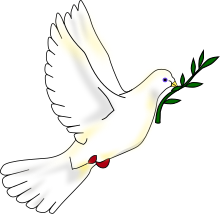利用者:軽快/私論/Wikipedia:削除依頼は戦場ではありません
| この文書は私論です。一部のウィキペディアンが助言や意見を記したものです。広く共有されている考え方もあれば、少数意見の見解もあります。内容の是非については慎重に検討してください。 |
| この文書の要旨: 削除依頼での議論は落ち着きと礼儀正しさを保ち、削除主義・包摂主義のどちらにも強く入れ込みすぎることのないようにしましょう。 |
- この私論は草稿であり、誰でも編集してかまいません。削除依頼関連の議論に興味がある利用者の参加は特に歓迎されます。

我々の百科事典の奥深い底では、ほとんど静かな戦いが激しさを増してきています。痛烈で、無慈悲で、際限なく。ウィキペディアでの新記事作成が滞る原因になり得る抗争は信頼できる情報源によって防がれているのです。[1][2]
この抗争が起こる場所は、AfDとしても知られる、Wikipedia:削除依頼です。削除主義・包摂主義という二大派閥が知られています。ただし、全員がこうした分類を有用なものだと考えているわけではなく、実際に、削除依頼参加者の多く、あるいはほとんどがこうした陣営に上手く収まるわけでもありません。一方で、これに対立する原理を表す語があるわけでもありません。
この私論では、いつぞやの参加者が対立する陣営を尊重することを覚え、全員が協調的に、また建設的に振る舞うことを期待して、抗争を惹起する様々な考えについて議論します。
包摂主義と削除主義
[編集]The results of holding these views too strongly
[編集]Both views are in their own way noble. But sometimes they are so passionately held they cause their adherents to behave in non-constructive ways – insulting other editors, trying to prove a point, engaging in passive aggression, and underhanded tactics.
Leaving aside the direct effect on the more sensitive editors, these kinds of behaviours perpetuate themselves by causing editors on both sides to become locked in a vicious circle of opposition. The result is a corrosive atmosphere that damages Wikipedia in many ways. Editors are drawn away from editing to instead engage in protracted arguments, and many editors avoid deletion discussions leaving only the battle-hardened few.
Breaking the circle
[編集]

All who take part in AfD will elevate the environment towards lasting peace if they conduct themselves in a calm and civil manner. Here are some suggestions that may help:
- Remember that the vast majority of editors are motivated by a desire to the improve the encyclopedia, just as you are. You may not agree with them, but mutual respect goes a long way.
- By behaving well you encourage others to, which creates an upwards spiral of harmony that helps the encyclopedia. Do as you would be done by.
- Almost everyone feels aggression sometimes, but AfD is not the outlet for it. Better arenas are online war games, un-moderated forums, contact sports, or you may even be able to find an ongoing low-intensity war that accepts foreign combatants.
- Voting is evil. Casting an unreasoned Keep or Delete isn't worth your while, as it will be ignored by the closing admin, but it will rile other editors. Explain your position, don't just state it. A well-reasoned statement of your argument is much better than an abbreviated WP:VAGUEWAVE towards a policy. Refer to policy without wikilawyering, read policies and guidelines before referring to them to make sure they say what you think they say, and try to avoid common weak arguments.
- Read the article and quickly look for sources before you read the deletion discussion, so your comments are based on the article rather than what others think.
- Remember that there may be no one right answer. Although there are common outcomes, different Wikipedians at different times may come to opposite conclusions. Many of our policies and arguments involve subjective judgement calls and may be contradictory. As User:S Marshall once said, "Wikipedia guidelines are like scripture: somewhere in the labyrinthine network of rules, you can find support for any position."
- Debates often hinge on notability. The general notability guideline is a good rule of thumb. Notability is not binary; there are grades of notability, and where we decide to draw the line is often a difficult decision. In particular, there is no community consensus on notability for fiction.
- Avoid badgering those who disagree with you. Comments that clarify positions or correct misunderstandings are useful, but replying to every comment that disagrees with you tends to be unhelpful. Trust other editors and the closing administrator to be able to judge the arguments on their merits.
- Read your comment in the preview window and ask yourself:
- Does it say something that you didn't say already?
- Does it focus on the article's merits, or some broader issue (e.g., a deletion philosophy) that should be discussed in another venue?
- Has the point you are making already been made more than once by other editors?
- Don't beat a dead horse.
- Read and consider all the arguments. There's no shame in changing your mind.
- Nobody wins or loses at AfD; it's the encyclopedia that matters. Put aside your personal feelings.
- If you make an error or lash out, an apology can clear the air. Why not have a nice cup of tea and a sit down with the editor you're in disagreement with?
- Make love not war!
If you wish to argue for deletion
[編集]
- Wikipedia:削除依頼#STEP.0 依頼の前にを読むことで、正しくない削除依頼の提出を防ぎ、削除以外の解決策があることを思い起こしてくれることでしょう。統合先となる候補の確認はしましたか?
- While checking the article history for signs of previous deletion nominations, also check the article view statistics. If an article is on a popular topic, it will tend to have secondary sources written about it and may have potential. Was it once in a better state, but has since succumbed to vandalism and inexpert edits?
- Consider if your search for sources was comprehensive enough. Did you use the wrong key words? Did you only look at the Google News hits for the last month instead of at the archive? Many news sources aren't included in Google News, or even online at all. Especially for articles that cover something technical, in a non-English speaking country, or from before Al Gore invented the Internet, sources may exist but not be immediately apparent. Are you taking care to counter our systematic biases? We may even need to resort to looking for sources in dead trees, or asking other editors for help.
- Once you determine that its necessary to nominate the article, be responsive to changes in the article during the discussion. It is not uncommon for articles to be improved to the point that deletion is no longer needed. If this happens, withdraw your nomination.
- It is good practice to leave a note on the article talk page and the page of the article creator. Consider a personalized message rather than a template.
- Be wary of nominating multiple articles in the same AfD. It can be appropriate in some circumstances, such as a group of obvious hoaxes, but it is good idea to only list one article at AfD and see how it goes, before listing an entire group. A bundled nomination can be overwhelming for participants in the deletion discussion, and may cause a backlash that results in all the articles being kept.
- Do not nominate a large number of articles on the same topic in a short period of time, as this can be perceived as an attempt to deluge editors who are attempting to find sourcing. Instead, nominate one or two of the articles that seem the least controversial of the bunch and nominate others if the community agrees that deletion is appropriate.
- The word "cruft" is wonderfully succinct, but it can be seen as pejorative and unhelpful. An acceptable alternative may be "unnecessary detail."
- If you tend towards the deletionist end of the spectrum, remember you don't have to win every battle; the article can always be re-nominated a few months on, when the dust has settled.
- See the other side of the coin - find an area which is lacking and start or improve an article. Content building can be hard work!
- Deletion sorting and the Article Rescue Squadron are not canvassing; the aim is to focus the efforts of interested editors. Anyone can look at the list of AfDs collected by these pages and join those debates.
もしあなたが記事を存続させたいと思った時は……
[編集]- 主題が包摂ガイドラインに合致するかを検討する時間は、記事作成前であって、削除依頼提出後ではありません[3]。
- いつまでも納得しない相手と長々しい「議論」をするのではなく、信頼できる出典を使って記事を改善させましょう。良い出典なしには、検証可能性や主題の特筆性を示すことはできません。
- 提示する出典を批判的に見つめましょう、それは本当に信頼できますか? その出典は主題を直接的、かつ、しっかりとカバーしていますか? 自分が好きな主題について、希望的観測で動いてしまったり、不適切な合成をしてしまうのはありがちなことです。
- 統合や「記事が扱う内容を変えてみる」など、存続の代わりとなる案についても話し合いましょう。ただし、削除依頼がクローズするまではこれらの計画を実行しないのが最善です。
- もしも、ある利用者が削除依頼を提出して、最終的に存続でクローズされたとしてもメシウマということにはなりません。依頼提出者は記事がガイドラインに合致しないと確信していたのです。そして、うまくいっていれば、削除依頼での過程を経てその記事の質は向上したのです。
- 別の面から見てみましょう。新しいページの巡回を確認して、ガイドラインに合致しないこと請け合いな記事がどれほどあるか目の当たりにしてみましょう。悲観的になること間違いなしです。
- 記事助け隊(Wikipedia:Article Rescue Squadron、日本語版で言えばWikipedia:加筆依頼?)は、存続票を投じるように求めるのではなく、(特筆性がありながらゴミになっているような)何とかなる記事の改善に焦点を当てたプロジェクトです。
- 削除依頼中で提示された全ての出典を記事に組み込みましょう。最終的な目的は削除依頼で「勝つ」ことではなく、読者の役に立つ記事を生み出すことにあることを忘れてはいけません。
- If you tend towards inclusionism, note that deletion is not necessarily the end of an article. You can ask for it to be userfied, copied to the WP:Article Incubator, or it can be copied to another wiki.
関連項目
[編集]- ウィキペディアは戦場ではありません
- Wikipedia:Extreme article inclusion - 包摂主義をエクストリームスポーツになぞらえた、ネタ記事
- Wikipedia:Extreme article deletion - 削除主義をエクストリームスポーツになぞらえた、ネタ記事
註釈・出典
[編集]- ^ BOBBIE JOHNSON (2009年8月27日). “Editors do battle over Wikipedia's soul”. Brisbane Times 2009年9月24日閲覧。
- ^ originally from The Economist (2008年3月17日). “The battle for Wikipedia's soul”. Financial Express 2009年9月24日閲覧。
- ^ 翻訳者註: 翻訳元の英語版ではIP利用者や新規利用者の記事作成は禁止されており、「Wikipedia:記事の作成」(Wikipedia:Articles for creation) で議論される。
